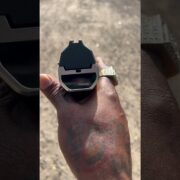Elected Democrats in Augusta continue to leverage last year’s mass shooting in Lewiston in order to secure passage of long-sought gun control measures that wouldn’t even have stopped the Oct. 25 killing spree carried out by Army Reservist Robert R. Card, Jr.
Democratic lawmakers signalled their intention to advance a so-called “Red Flag” law late Wednesday evening after spending much of the 2024 legislative session haggling with Republicans and Gov. Janet Mills over separate gun control proposals.
[RELATED: Troy Jackson Backs Gun Control After Gun Control Group Hires His Son’s Firm…]
Maine’s Judiciary Committee will hold a public hearing to discuss a significant change in gun laws, but hasn’t announced when the hearing will be or how much notice the public will be given before the bill is discussed.
“I think it’s absolutely absurd that on March 28 we’re referencing major substantive public policy to committee in which a public hearing is going to be held with little or no notice to the public,” said Sen. Matt Harrington (R-York).
The bill, LD 2283, would be a significant expansion of Maine’s already existing “yellow-flag” law into a stricter “red-flag” law, making it much easier for the state government to seize firearms from people deemed a threat.
Sen. Harrington was outraged at the decision to hold a public hearing on the controversial bill without advanced notice to the public, which will likely result in lower public attendance.
Harrington asked Sen. Anne Carney (D-Cumberland) how much notice Mainers will have before the bill is given a hearing, but she could not answer, claiming that the scheduling depends “to some extent” on the availability of American Sign Language interpreters.
[RELATED: Top Maine Democrat to Hunters: Support Gun Control If You Want to Keep Hunting…]
The surprise move is just the latest in a series of legislative maneuvers the Democrat-controlled legislature has used to drop major pieces of legislation with little notice to the public.
Using last-minute amendments to so-called “concept drafts,” lawmakers can unveil legislation days — or even minutes — before a public hearing. The tactic ensures that those who oppose a given measure will be unable to take time off from work and arrange to be at the State House to testify on the bill.
Currently, Maine law provides for the temporary removal of firearms from someone deemed to pose an extreme risk to himself or others, allowing family members to contact law enforcement with their concerns.
Police will then take the person into protective custody if they deem the risk to be credible.
After being taken into protective custody, the gun owner will be given a mental health examination by a doctor.
If, after the exam, the person is determined to be mentally ill, and the medical professional and law enforcement agree that he poses an extreme risk, police can request a court order allowing for the temporary removal of his firearms.
Only then can a court temporarily remove someone’s firearms.
An independent commission tasked with investigating the Lewiston mass shooting found that the existing Yellow Flag law could have been used and should have been used in the case of Robert Card.
Law enforcement were informed of the threat posed by Card, but failed to act in accordance with the laws already on the books.
In that case, it was not the insufficiency of the “yellow-flag” laws which failed to stop Card, but a failure of law enforcement to enforce those laws.
The new gun control bill, sponsored by Maine’s far left House Speaker Rachel Talbot Ross (D-Portland), would significantly streamline the process required to revoke someone’s Second Amendment rights.
Under the new bill, any family member can directly report concerns to a court, which will then hold a hearing within 14 days of the notification and decide whether to revoke someone’s firearm rights for up to one year.
In most cases, the court must notify the subject of the request before the hearing, but, in “emergency” cases, the court can issue a crisis intervention order over the phone without notifying the subject of the order.
“The bill also allows a court to issue an emergency crisis intervention order by telephone
or other reliable electronic means without notice to the person who is the subject of the requested order,” says the bill.
It does not define what constitutes an emergency.
The emergency order removes firearms for up to 14 days, with an actual court hearing scheduled in the same time period.
[RELATED: Cases Less Severe Than Robert Card Triggered Maine’s Yellow Flag Law Firearm Restrictions…]As Maine Democrats try this last-minute push for stricter gun laws, the Biden Administration is working towards the same goal.
On Saturday, U.S. Attorney General Merrick Garland announced the establishment of the National Extreme Risk Protection Order Resource Center, which is meant to encourage more states to enact “red-flag” laws.
The center is also meant to instruct officials in “optimizing the usage of red flag laws,” and will help states seeking to implement the laws.
-

1 Rapper Rod Wave faces more than a dozen charges, some involving a gun, in Georgia
-

2 Trump Admin Reverses Biden Ban on Rapid-Fire Gun Modifications
-

3 Matthew McConaughey Wants Gun Owners To Take Responsibility For Criminals Actions
-

4 Dems score legislative wins on gun control, other issues in Colorado | Colorado
-

5 One killed, more than a dozen injured in mass shooting at Houston house party
-

6 Thousands rally for gun control in US as mass shootings surge | DW News
-

7 Gun training courses experience surge in sign ups
-

8 Gun Control | The Complete Moderate's Guide
-

9 Biometric smart gun
-

10 What can the US learn from Australia's gun reforms?



